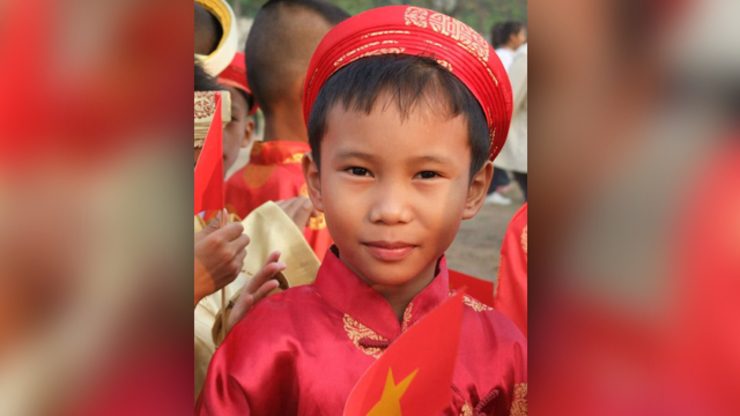SUMMARY
This is AI generated summarization, which may have errors. For context, always refer to the full article.

My son Kairos Luther and I emigrated to Nakhon Ratchasima, Thailand, in 2011 to follow my husband who was then an NGO volunteer posted there. Later, he got a teaching job in north Thailand.
Kairos was no stranger to Thailand because we had visited his father frequently before that. He was adjusting faster than I did. We enrolled him in a Thamada (regular) school, where all subjects were taught in Thai. Government and private schools are Buddhists since it is a part of their culture. Temple visits and meditation time every morning were part of school activities. We knew, Kairos must survive the Thai way of life and embrace Buddhism, aside from learning the language and the scripts.
In Grade 1, we enrolled him at Padoongrasda, in Phitsanulok Province, a Christian school founded by the Protestant missionaries. He is now in Grade 3. We enrolled him again in a private school, since we moved to Nakhon Ratchasima, another province. Again, he was the only foreigner in his school.
There were already quite a number of Filipinos in our province; some also have kids as old as Kairos but either home-schooled or in English programs. Many of them discouraged us from enrolling him in a Thai school because “he will not learn English.” Aside from the fact that fees in the English Program are exorbitant, we want our son to assimilate in the Thai culture because we are living here. Now, Kairos is fluent in both Thai and English, an advantage he would later use in life, specially now that the full integration of ASEAN will commence in 2015.
Living in a Buddhist society, Kairos find it difficult to comprehend the Christian God and Buddhism’s way of life. Every Sunday, we attend the Mass to expose him to Catholic faith. In time, we want him to choose a religion where he could become a better person, not the one that is imposed on him by us or by society. Indeed, religion is becoming a part of his mixed culture.
It may be difficult for some Filipinos to understand why we are raising Kairos in a way that is not “Filipino,” like pagmamano (kissing of hand) or saying “po” and “opo.” As a student, he is exposed every day to Thai culture. Instead of “mano” he does the “wai” or bowing of head with hand together and saying khap khun khrap, instead of saying “salamat.” In the Philippines, during or short vacation, we always remind him to “mano,” yet he still says “wai.” It is an Asian gesture which I believe is more acceptable in other neighboring countries instead of the “mano.” Yet, I know it is a part of the Filipino culture that he must learn.
Filipino taste
Food is an important part of a person’s culture. In spite of mingling with the Thais 5 days a week, Kairos could not eat spicy foods. My husband cooks his lunch. Whenever we cook during weekends, we explain to him that we are eating specific Filipino foods, like adobo, sinigang, kare-kare, tinola, or menudo, and sometimes ginisang monggo. Introducing food from our country makes him aware of his heritage as a Filipino and he has something to compare with Thai food.
Food set him apart from his classmates. One time, he told me that his classmates do not want to taste his food because it is Filipino; not spicy, not “aroy” (delicious). In spite of his looks, his ability to speak and write in Thai, he is still different, a Filipino. His being Asian is set aside, because he eats different food.
We hardly have time to tell him stories about our heroes, like Bonifacio and Rizal, because we are occupied with work. One time I caught him waving the Philippine flag while singing Thailand’s national anthem. We taught him “Lupang Hinirang” to let him know that the anthem is associated with the flag.
In spite of his seeming “Thai-ness,” his patriotism showed during the fight of Manny Pacquiao versus Juan Manuel Marquez in 2012, shouting all the time that “Taga Pilipinas naman tayo!” thus must cheer for Pacquiao. (We are really from the Philippines!)
“Taga Pilipinas naman tayo!” even though his hero is King Naresuan the Great, who fought the Burmese to save the Thais. And we both realized it is time for him to know Andres Bonifacio, Jose Rizal, and not only Manny Pacquiao.
We maybe raising him in an Asian country, similar to ours, yet different. We may look the same, but we are still divided by beliefs and culture. In this context, Kairos and the hundreds of Filipino children in Asian countries are facing similar situations, adapting to the cultures of their host countries, yet they are still outcasts. Thus, it is important to build their identities as Filipinos by knowing our culture, be it in food or by simply telling them “Tayo ay Pilipino.” (We are Filipinos.) – Rappler.com
 Eunice is an English as a Foreign Language (EFL) lecturer at Vongchavalitkul University in Nakhon Ratchasima Thailand and a freelance writer
Eunice is an English as a Foreign Language (EFL) lecturer at Vongchavalitkul University in Nakhon Ratchasima Thailand and a freelance writer
Add a comment
How does this make you feel?
There are no comments yet. Add your comment to start the conversation.